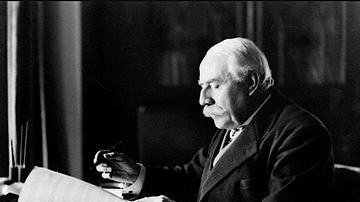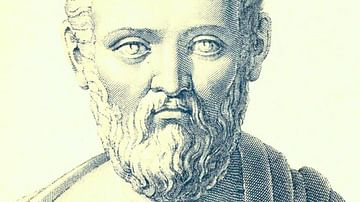Search
Search Results

Definition
Edvard Grieg
Edvard Grieg (1843-1907) was a Norwegian composer known for his songs, piano music, and the Peer Gynt suites. The composer was famous in his own lifetime, touring extensively to play and conduct his own works across Europe. Grieg's Romantic...

Definition
Edward Elgar
Edward Elgar (1857-1934) was an English composer best known for his orchestral music and oratorios. Amongst Elgar's most-loved works are his Pomp and Circumstance marches which inspired the choral Land of Hope and Glory, a rousing patriotic...

Definition
Antonín Dvořák
Antonín Dvořák (1841-1904) was a Czech composer best known for his symphonies, symphonic poems, operas, and chamber music. Dvořák's best-loved works include his 9th Symphony (From The New World), the American quartet, and his Slavonic Dances...

Definition
Isocrates
Isocrates (436-338 BCE) was an ancient Athenian rhetorician, characterized as one of the most prominent orators of his time, even though it appears that he restricted himself to writing speeches and not orating them himself. His most notable...

Definition
Dante Alighieri
Dante Alighieri (1265-1321) was an Italian poet and politician most famous for his Divine Comedy (c. 1319) where he descends through Hell, climbs Purgatory, and arrives at the illumination of Paradise. Dante meets many historical characters...

Definition
Pausanias (Geographer)
Pausanias was a Greek author, historian, and geographer of the 2nd century CE who journeyed extensively throughout Greece, chronicling these travels in his Periegesis Hellados or Description of Greece. His ten volumes of observations are...

Definition
Ancient Greece
Greece is a country in southeastern Europe, known in Greek as Hellas or Ellada, and consisting of a mainland and an archipelago of islands. Ancient Greece is the birthplace of Western philosophy (Socrates, Plato, and Aristotle), literature...

Article
Historical Accuracy in the Film Agora
In 2009, film director Alejandro Amenabar brought the story of Hypatia of Alexandria (c. 370-415 CE) to the screen through the feature film Agora. Years later, the movie continues to draw criticism from Christian writers for its depiction...

Article
The Book of Jonah
The book of Jonah is the fifth book in the Christian canons and the Jewish Tanakh. It is one of 'Trei Asar' (The Twelve) prophets in the tanakh, and in Christian tradition as 'oi dodeka prophetai' or 'ton dodekapropheton' , Greek for "The...

Article
Sicilian Temples (Greek Metrology)
Characteristics of Sicilian Archaic Temples The large dimensions of the components, the presence of a propteron, an adyton, and other specific elements of the plan and elevation speak for an originally very autonomous development of Sicilian...